Online teaching - How are the teachers coping?
What is going on at the other side of the screens? That is what we, the Vonk committee, asked ourselves after experiencing several weeks of online classes. How are our teachers doing? What do they think about online teaching? Do they miss us already? About a month ago we decided to start an ambitious project, we wanted to interview as many teachers as possible who had to deal with the online classes. We interviewed 11 teachers and we asked them the same six questions. You can watch a summary of the interviews of 9 teachers in a video! The full interviews and 2 exclusive interviews can be read in the article.
The video:
The interviews:
Dr. Ir. Anne-Johan Annema
So our first question is How are you?
“I’m fine. It is a little bit weird, ‘cause right now I’ve already been working from home since mid-March which is already quite a long time. Especially the first month, we were quite busy since we had to switch rapidly from on-site to online learning. For the Education management it was really a big change: I think Cora, Maarten and I worked 7 days a week, 10-12 hours per day, in those few months, but we hope that we managed to get all the modules, courses and lecturers on speed. I hope that we got all the education back on to basically what it should be: valuable. I guess also for all the students it was a big change. I hope that the students noticed as little as possible from that because that is obviously what should have happened: education should go on as good as possible. But right now, since this week, it’s been a bit less stressed so now I’m going to start grading module 3. That had to be done mid April, so I’m almost on time, haha, I guess I’ll be two months late, but that’s what it is. So perfect, haha.”
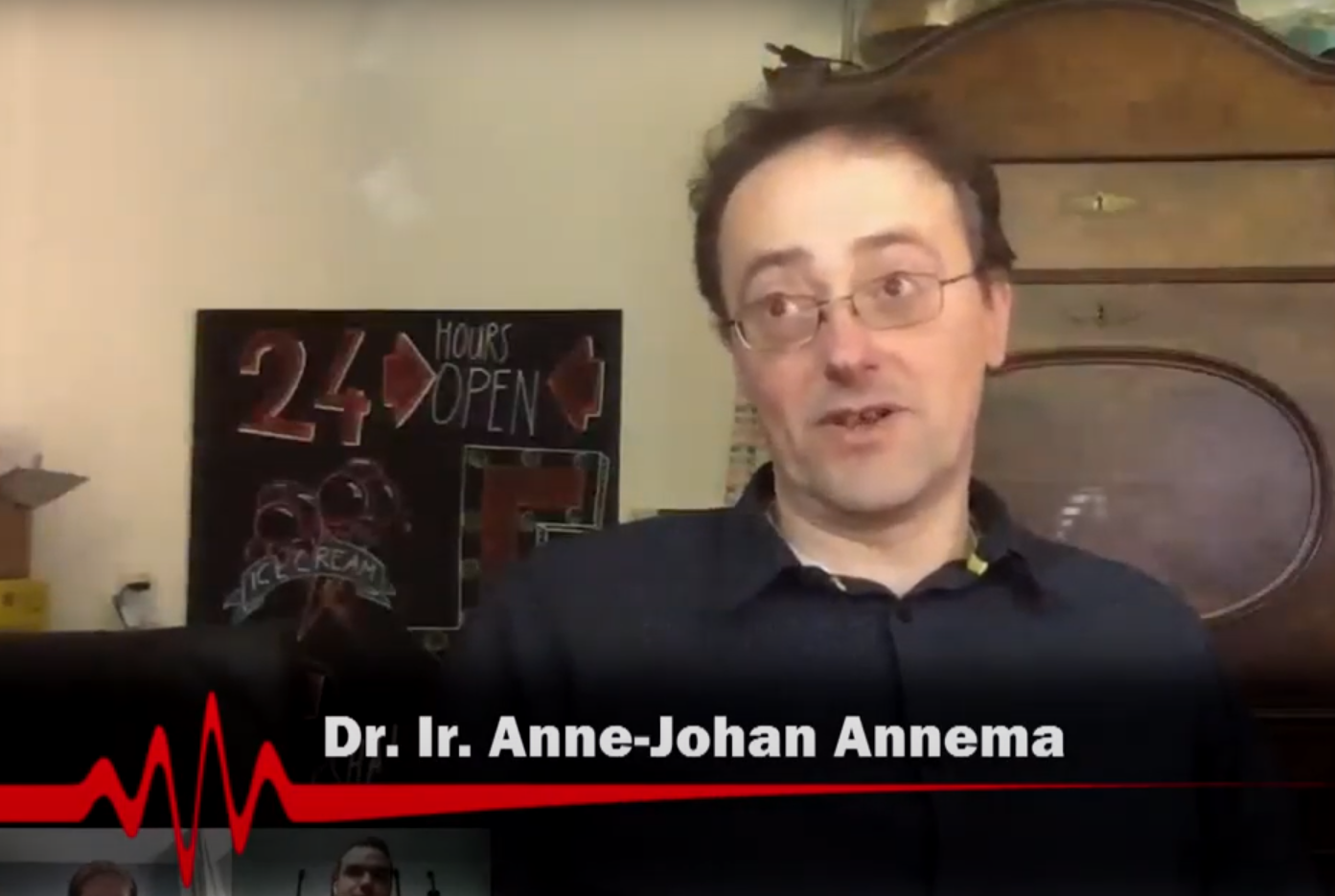
So, you start grading and you need a nice workstation to do that… What does your workstation look like?
“This interview is on my laptop. My workplace looks like this… there’s another laptop, iPad and a monitor and of course the laptop that I’m using for this online meeting. It’s in this room, that used to be a spare room, on the ground floor. Everything’s available here: microphones, laptops, monitor, pens, mouse, even a mouse pad and most importantly and obviously my cup of coffee. This is where I’ve been living for already quite a long time.”
It’s nice to see the other side of the screen. So you were teaching in Module 3, and we were wondering what were the benefits of online teaching that you experienced.
“The benefits of online teaching… well there are a few. We did the first project in module3 on site, but we had to move the final project to online. I did not like that since we could not address quite a few topics that otherwise would have been there. At the same time we did arranged a lot of supervision for the online stuff in module 3 because we expected a higher supervision workload. You might know that in our projects we have 4 or 5 PhD students, that really know what they are talking about, and usually in the WestZaal they are working all day and students are walking by for assistance all day. For the online project, the student had to register to get help and supervision (because otherwise it’s going to be a big mess). All PhD students complained to me that roughly on average they got 2 requests per person per day and that’s not a lot. I’d speculate that is because students thought of the issues that they were stuck at before asking online help, so that would be a benefit. We still have to grade the projects, so I’m not sure yet about this benefit… Another thing that’s really nice online in my opinion, is in lectures, I can easily do some exercises and can easily form breakout rooms to work together on exercises. But apart from that benefit, not so much, no. Not getting sick is also a benefit.“
That’s a great benefit. You managed to list more benefits than most of the people we interviewed. I’m sure you can also list a lot of disadvantages about online teaching.
“Yes I can. Online we have to change a lot in our education. We made some pre-recorded lectures, made some pre-recorded movies even. Sometimes voice-over PowerPoints. Well, making them is a lot of work but that is not the main issue since it can be recycled. I think the main issue is that if you make a pre-recorded PowerPoint or short movie they really have to be short and clear. So, the setup is completely different from an onsite lecture. In an onsite lecture you also play with the audience. You see the audience, so you know what they get and what they don’t get, and if they easily get everything then you need to back off a bit, so you need to be more unclear in order to motivate the students to think about it. If they don’t get stuff you also notice that easily and then you can be more clear. So, you can tune your lecture based on your audience at any point in your lecture. And you can easily switch to doing exercises, you can easily switch to throwing in an example , you can do all kinds of things on site because you can see and note the audience. So that’s very helpful. Online, it’s a short voice over PowerPoint, a short movie, that all have to be very clear. But, then you run easily into the situation that students have the false impression or illusion that they mastered the subject since the explanation is clear. That’s not a good thing. You cannot tune it exactly to your audience.
Of course, you can do an online live lecture, you can record it, you can put it on site so the people can view it later on. Tutorials: it’s about the same thing, these have to be different online. In a tutorial the students should make exercises, should note what they did or did not master yet. I can’t walk around online and pinpoint some minor things. I can’t walk around and say stupid things like ‘you might start because then at least you started’, and I can’t say ‘okay, you already finished this exercise, maybe do this and that exercise’ to motivate students to step up their level. So you can’t tune the education towards the students, you can’t step up for the very good students, you can’t motivate all the other students easily, so uhh that’s really not nice.
I already mentioned in the projects and the labs… well we had to change something. In module 3, at the very end, students design and make a 100MHz audio link because that includes everything so far in the module. It includes modelling, which has to be done properly, it includes hand derivations, calculations, simulations, building, amplifiers, oscillators, stability, and includes a look ahead to module 4, the Fields and Waves. Well…, that can’t be done online. The equipment is not there. You can’t build it on your desktop and measure it using a myDAQ or using anything else that’s not expensive equipment. You can do circuit simulations, but then you’re actually missing something. That’s really more like swimming lessons without a pool. So we had to back off in a lot of interesting stuff and that’s too bad.
Besides that, we also had to do online examinations. I didn’t want to do it immediately in module 3 since I wanted to do a fair examination. Fair towards the students- level wise and not running into the risk that we would have to invalidate the test later on. Risking having to declare a test invalid is certainly not nice. So, we really did a lot of work towards fully randomized online examinations, to give every student a personalised, completely different, exam, with the exact same end terms for the course. To be able to do assessment for every student using different schematics, different derivations, different whatever. Still valid in the context of module 3 but also valid in the sense that it is going to be a valid exam. That’s why the exams were also late, not nice for the students, really not nice for us because it’s really a lot of work. But that’s the best that we could do. Onsite that’s easier for students, easier for lecturers. These are a few downsides of online.”
So in the end which one do you prefer, online or physical classes?
“That’s easy, it’s physical.”
That’s obviously what was expected. We are at our last question, which is do you have a message for the students?
“Yes, in the past few months, I also got and asked for a lot of feedback from the students about how it’s going, what works for them and what doesn’t work for them. And from most of the students, I was really happy to hear that the switch to online education worked out really nicely, and that’s really great. At the same time, I know that it’s hard for many students because it’s quite different. Students have to motivate themselves more than what it used to be. But I do see a lot of students really shining, really stepping up, really getting to the next level, great! So I want to encourage every student to get the best out of themselves, to really shine, to make the best out of this really shitty situation and you can! As I know you, I am convinced that you can really shine also in these times, so please do so.”
Ir. Bert Molenkamp
How are you?
“I’m fine. I always cycle to the UT. In this corona period I try to cycle every day. Until now the weather is fine. My weekly volleyball evening is cancelled. But I know I’m lucky that I don’t have young children to teach. I see the images on the TV where families are working at a table and tutoring primary school children at the same time. In our chair computer architecture for embedded systems we still have our daily coffee break sessions using teamspeak. We, members and master thesis students of our group have our own “room” in teamspeak, and also our coffee room “Rappa” (Dutch “randapparatuur” room, with printer, coffee machine). This is a great initiative of our PhD and master students.”
What does your workstation look like?
“I use a notebook, and occasionally two notebooks. I also use a Wacom tablet for writing. Furthermore I have some FPGA boards at home. Most of the time I work in the living room and when it becomes more private I move to the attic, e.g. for appointments with students and online lectures.”
What are the benefits of online teaching that you experience?
“If you would have asked me this before the “Corona time” I would probably be negative. I like to have interaction with the students. But I am surprised how good an online lecture goes. For a lecture I use two notebooks. One notebook is configured in “student view”; I see what a student sees. The other notebook is used for the lecture. BigBlueButton prefers to include a presentation as pdf in the environment, but I prefer to share my powerpoint presentation because my slides have animations. With the Wacom tablet I write on the slides. Students really ask questions in the chat box and when I ask a question I also get answers in the chat box. So I still have interaction with the students.
A couple of weeks ago I gave a course for a company using Zoom. The participants also had to program an FPGA, but they didn’t have one. They did all the steps, except the last step: programming the FPGA, I did the programming and gave a demo. Screen sharing also helped me debug their code. The participants were very positive with the online course.”
What are the disadvantages of online teaching that you experience?
“Well you have to inform your family that you are not to be disturbed. For courses that require lab facilities, like Embedded Systems lab, it was more difficult to find a reasonable alternative. For real-time systems 2 an alternative hardware solution is used that students have at home. I expect that the Kick-In, end of August, will also be (partly?) online. I think seeing each other the first time physically is better.”
Which environment do you prefer, online or physical classes?
“To my own surprise, I am very positive about online teaching. Until now, I only had smaller groups (up to 40), so I don’t know what my experience will be in September with over 300 students. With the distance rule of 1.5 meters, I wouldn’t be surprised that we still have some online teaching next academic year.”
Do you have a message for the students?
“Perhaps very briefly: keep in touch with each other.”
Prof. Dr. Ir. Bram Nauta
First off, how are you Bram?
“I’m good, working a lot from home where I have a nice workspace, but at the time of the filming I am in the university. Because the Master’s and PhD students have regained access to the labs, there was a need of supervisors and that is where I volunteered. I really enjoy the bike rides to and from campus, biking through the forest with very little to no noise. I spend about 2 days a week at the university. At the campus it is quiet, I really miss the students. There of course are the students I work with that I get to meet, but it’s a very small group. Anyhow, it is great to be on campus again. When you arrive on campus and the sun is out, you really appreciate the beauty of the campus. Where you would normally be distracted by all the people, now it is really possible to let the environment sink in.”
What does your workstation look like?
“At home, on ground floor I have a large room as an office. I enjoy looking at the front garden and seeing the delivery man enter my yard, bringing me my daily package. We kind of became buddies because I see him every day. An important object that I use daily is my large isolating coffee mug, which enables me to have coffee during longer meetings without having to make a new batch. At university, I have confiscated the coffee machine from the secretary so that I can make coffee directly from my desk. It enables me to make fresh coffee, even during meetings, although I do have to mute myself to silence the coffee machine goes brrr. I especially did this to keep the coffee machine from getting infected, so everybody has to visit me and I have to play barista all day, which I very much enjoy.”
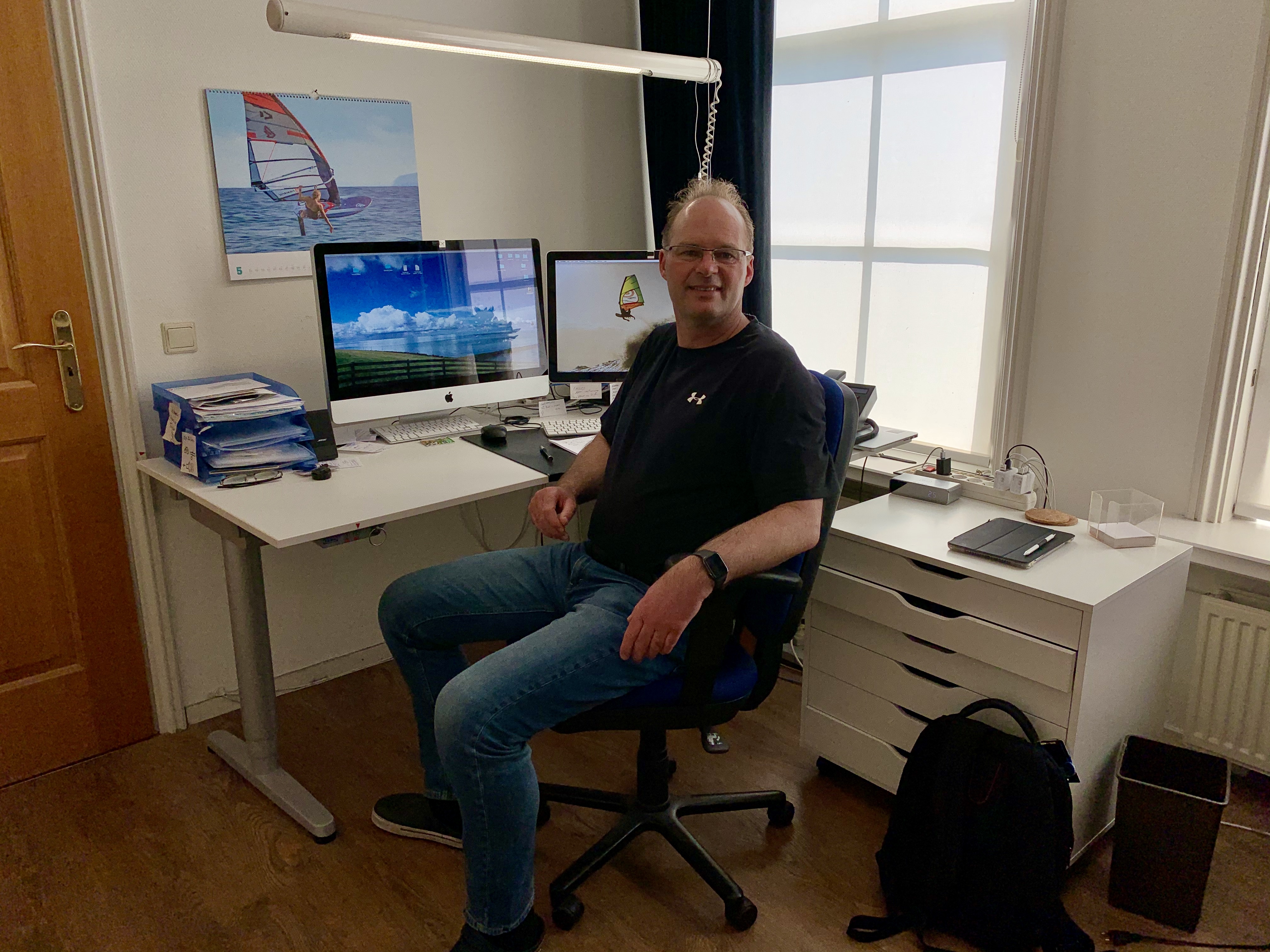
What are the benefits of online teaching in your personal experience?
“I like that people dare to ask more questions using the chat function. Normally, students tend to be a bit shy. It is also nice that other students will answer questions of their fellow students, while it is possible to drop a question when I’m busy with something else. It can be a bit frustrating though, yesterday I had wasted 20 minutes to completely reboot because of the drivers messing up. An advice for other teachers: reboot before any online activity, even if you don’t think you need to!”
What type of teaching do you prefer, now that you have experienced both online and offline teaching?
“I do still prefer real life teaching, it’s way more fun because of the interaction. I like to teach, mostly because I like to work with students. Sitting in front of a screen really eliminates this experience.“
Do you have a message for the students?
“Yeah! Don’t get depressed, stay happy! Keep thinking about how you can tell your grandchildren you survived the pandemic and Donald Trump, so you can prove you’ve been through some tough times. If you’re having a hard time studying, don’t worry about it too much, there is no better excuse to take a moment of rest within your study. Your future employer will completely understand in hindsight, so don’t worry if you are not as productive as you might have been otherwise.
Maybe start a personal project, keep moving, take a bike ride for example. Don’t forget your (grand)parents, be nice to them. Try to socialize online as much as possible, to prevent socially isolating yourself. It is just a bit of history which will go over.“
Dr. Ir. Cora Salm
How are you?
“I am very good; I am still healthy. I am very busy, now I immediately realize why I did not switch to flipped classroom years ago because it is so much work.”
Would you be able to show us your nice workstation?
“I can, I have a phone and an iPad. I have a laptop with a camera and a monitor with an external webcam.”
I believe you are teaching now and during the previous module. What kind of benefits of online teaching did you experience?
“I decided immediately that I was going to do flipped classroom, which means I make videos and the students can watch the videos prior to the class and then ask questions about it. The good thing is you can be sure that the audio quality of the video is okay and if students have any problem with the connection, they can look at it in a different time slot. For me as a teacher, it shows that those students, that are in the video conference, are prepared for the class; whereas, in the past you would see students that hop on their bike, sit in the class, do what they are doing but not necessarily prepared or even paying attention. That I would say is one of the benefits, that there are many students, who are really prepared and eager to pass the class. They come up with very good questions.”
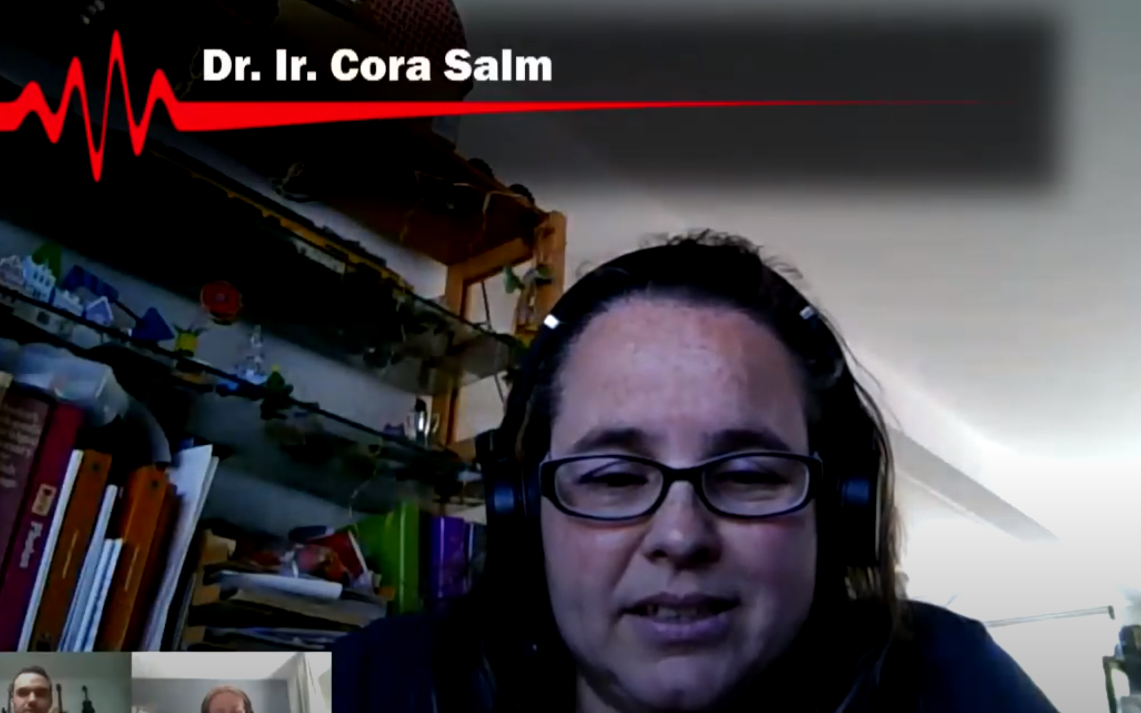
I think you were also experiencing some disadvantages of online teaching. What kind of disadvantages did you face?
“The making of the movies is a lot of work, although in the beginning I used to edit all the time and edit all the weird sounds out (“ah” etc.). Now, I am getting a little bit better at the software for video editing and I do not pay much attention to those noises anymore since we also make those sounds during a live lecture. I only edit out the big mistakes. What I also observe is that, now, there are students that are in a different time zone and for them it is difficult to come to some sessions, because I still have tutorial sessions, but I don’t necessarily have time to do the tutorial in different time slots. That’s why, for those students, it is difficult. I have a class for Advanced Technology in which we use Discord, which is a gaming platform, and in Advanced Technology and Applied Physics, they use that for a lot of classes, which means that as a teacher you can switch between classes to see if there are students with questions in other lessons. In Electrical Engineering, I am not sure if there are many teachers using this platform. If you are in a Canvas conference, at least in my setup, it is very difficult to switch from a session to another. Also, if you have the breakout rooms, every time I switch from a room, I have to reconfigure my audio, which means that if I am using breakout rooms, I have my phone in one room, iPad in other room and computer in a different room so that, if there is a question, I just have to mute the correct audio. That sometimes works the best. This I find as the disadvantage of online education and some bandwidth problems. Every now and then, I cannot get connected at all for some reason. I live close to the university, sometimes I had to cycle to UT and sit outside the building, to get connected to eduroam and work a little bit there. This is fine in nice weather but if this situation continues in the winter, I am not going to do that.”
Which environment do you prefer: Online classes, physical classes or sitting outside Carre building?
“The benefit of online classes is that sometimes it is much more efficient because the students are prepared and have good questions, you save a lot of time. I can, now, have more meetings in between the classes which I cannot do in a physical class unless it is an emergency. On the other hand, for me as a person, I have to sit in front of the computer, almost the entire day. Before, I was able to walk to Horst building, hop on my bicycle at least, which I cannot do right now, and it is a disadvantage. Online classes have pros and cons, I am not really sure which one I would prefer yet.”
If this would continue for a longer time, then would you be fine with staying online?
“Yes, for module 1, we are already preparing for the fact that maybe the student would also have to do the labs partially, either at home or in a room not being the lab room (Westzaal). We have decided that we will transform to the platform using an Analog Discovery2 of National Instruments and all the students will either get one on a loan based or they have to buy one as the replacement of the old myDAQ that we used to have, but I am not sure about the construction yet. That means that we can do most of the labs in smaller settings which also means that we will need more TAs, but that means the lab work can be done. And then, maybe the old way of doing lectures, teachers speaking in classrooms will be changed. I think I would like to keep some of the online education (videos), even if we were able to go back full time to the university. Having the videos, and having the students be prepared is a good thing.”
Do you have a message for the students?
“Stay healthy. When I go to the supermarket, I see a lot of people not adhering to the 1.5-meter rules. I know it is tempting and know that in Twente, fortunately, there are not many sick people, but we want to keep it that way. That would be my first message. My second message is, although all the teachers and the study advisors are busy, we are also paid to help the students. So, if there is a problem, do not hesitate to contact somebody because maybe it is something we can fix or maybe there are students before, who had the similar problem we can help you with. For my case, if you do not get a response for your email, just email again next week, because I did not forget you, I am just very busy. This is a personal message but may also hold for the other teachers.”
Daphne Boere Msc.
How are you?
“I’m fine actually, thank you.”
How is working at home?
“Especially in the beginning it was hard to adapt, I have two little kids. 1 is going to school, the other is going to kindergarten for several days, but now they are at home. Me and my husband cannot work simultaneously when the kids are at home, so we had to divide hours. Since we are both working in the vital sector we have to work. So, we can make use of the Corona day-care, we started using that after one week. That helped a lot for our own structure and that of the kids, it has brought a lot of peace in the home. Since then we are coping very well and the four of us are in good health.”
What does your workstation look like?
“We have a home office. My husband works in Germany, his office is a one hour drive away, so normally he works from home a couple of days a week. Since the quarantine, I either work at his workspace which is the attic room and is nicely decorated with a desk, a separate monitor and his working chair, although it is too big for me which causes me a little bit of back pain. I work there half of my working hours and the other time I’m either sitting at the desk of my 5-year old with my laptop, with no separate mouse or screen. Or I’m sitting at the living room table when the kids are not at home.”
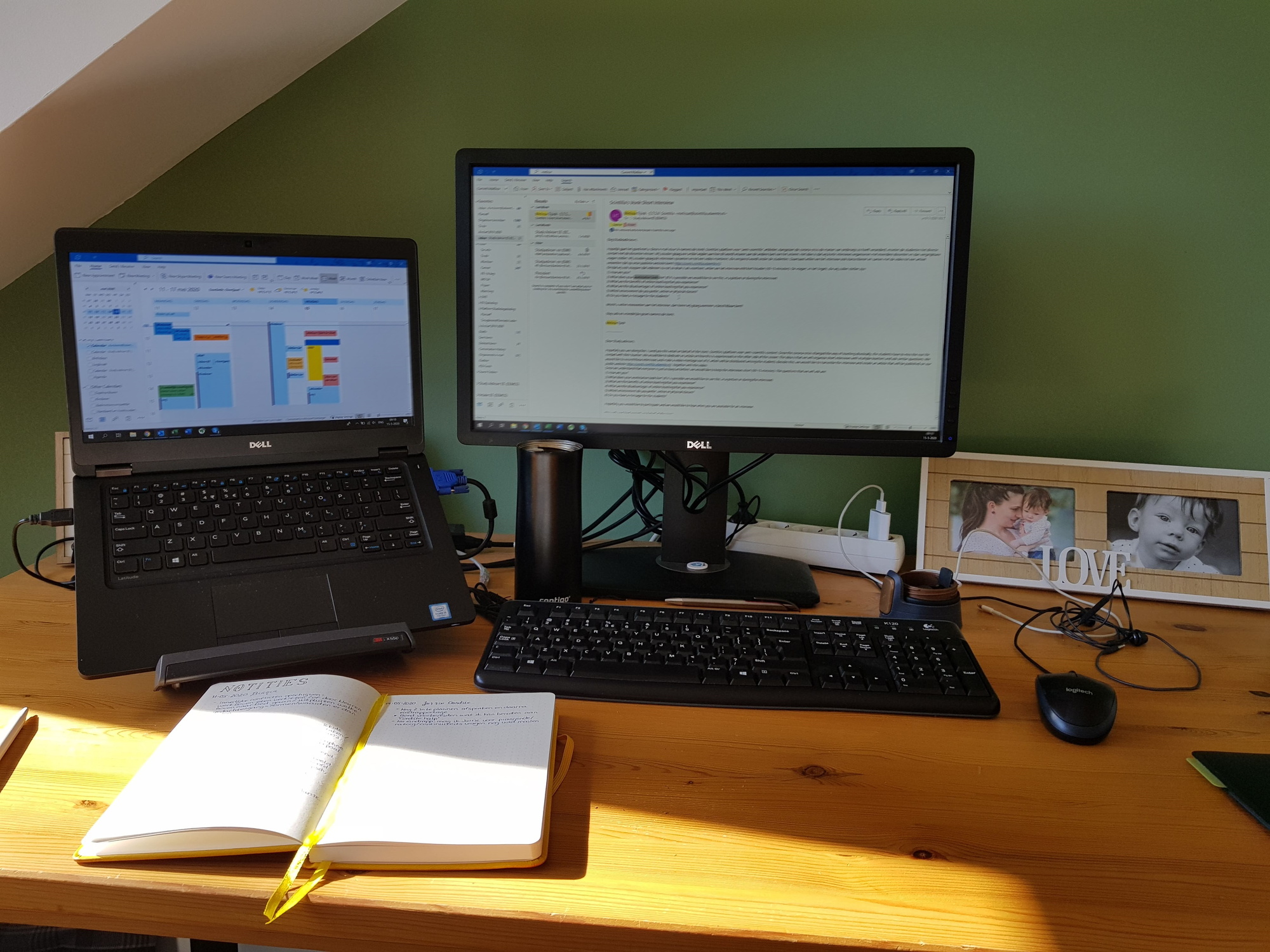
Do you see any benefits with online teaching?
“I do see benefits for me personally, I don’t have any travelling time. Although I live 8 minutes cycling from the university, I do have to drop off the kids and have to make a different route. At the end of the day I have to go home as I have to pick them up. Since they are now home most of the time already, there is less stress and more stretch. My husband is always at home, so that gives me… he cooks more during the week, so that gives me more free time, or more work time. Going from the one meeting into the other, they are all on your laptop, so you don’t have traveling time there.
From a student perspective, it might be beneficial that they don’t have any travelling time either. That they can contact you or Skype you. Maybe they experience a better availability for the study advisors, in multiple ways. They can chat with us or message us or call us or video calls us. And they can do that, well not any time, but during work hours or right after college.”
Do you find any disadvantages?
“The two main disadvantages are not being able to speak to the students in real-life, to see them, to smell them actually, because that gives a good impression of how people are doing as well. I don’t hug students, but I miss the contact. I can’t walk with them; you don’t bump into students. I can’t go and have a look in the Westzaal, I made it a habit of sometimes just hopping in there and showing my face, I can’t do that right now. That is what I miss. The other thing, I miss my colleagues, we have meetings, we speak to each other, each week, at least once. I really miss the after talks of those meetings. Not that I hug my colleagues, but I miss the physical contact.”
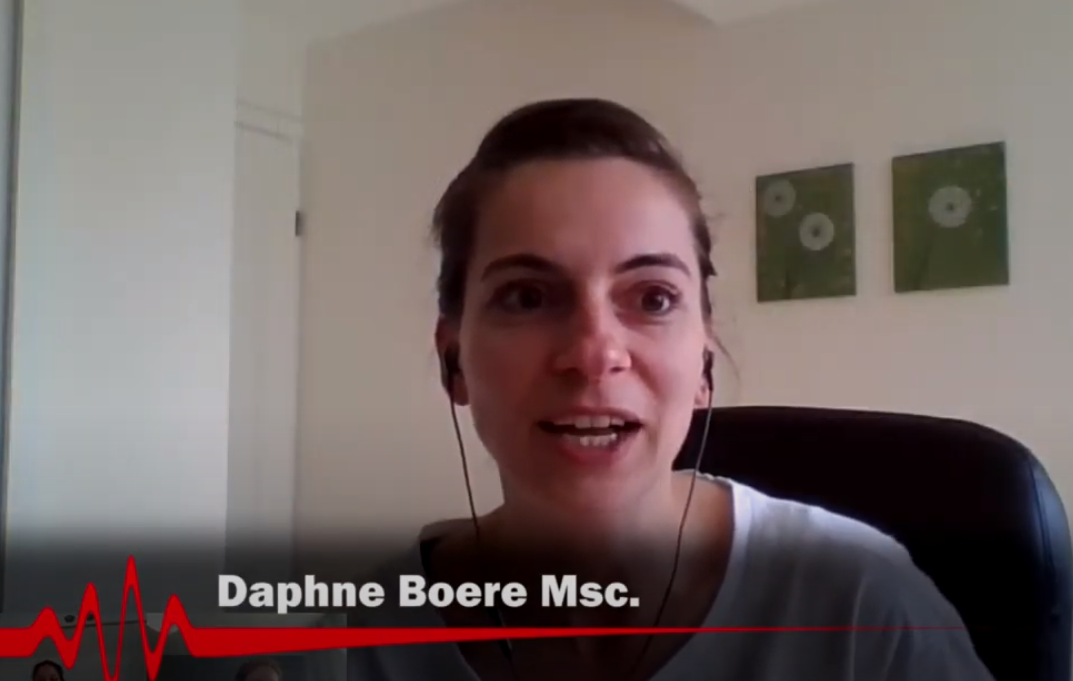
Which environment do you prefer?
“I prefer the physical, although I do see advantages of the online situation. I can imagine an ideal situation where a combination of both could be used. Also, with the world problems, pollution, less cars on the road, better possibilities if you are ill or when you are not able to come to the campus. It could be cool to have an optimal combination.”
Do you have a message to the students?
“Yes! Take good care of yourself, if you experience any mental or physical signs of your body, please take them seriously. Don’t go and lie in your bed, but act upon them. It is your body; it tells you a lot of information. Don’t just don’t run along. I think that always counts, but specifically in a quarantine situation. Except that it is a challenging period for everyone, including you. And then deal with it. Don’t get stuck, go out and try to see the positive side. In Dutch: ‘Omdenken’, so turn things around, see if you can get the benefit of the situation.”
Dr. Ing. Eric Klumperink
How are you?
“Fine, thanks.”
What does your workstation look like?
“I have a laptop and an extra screen above it. I have the luxury of a (small) office-room on the first floor.”
What are the benefits of online teaching that you experience?
“I can give easier “hands-on training” by screen sharing of e.g. LTSPICE circuit simulations on my workstation via CANVAS Conferences; Also students can all ask questions concurrently via the chat and I can answer them in a logical order instead of first-come first-serve.”
What are the disadvantages of online teaching that you experience?
“I mainly miss the immediate interaction (eye contact and body-language in response to presenting material). I hear from students and also experience myself that it is more tough to stay fully focussed and not get distracted by other matters.”
Which environment do you prefer, online or physical classes?
“It depends on the activity. I prefer online classes for some hands-on training and shared feedback and question hours. I prefer physical for more personal interaction and individual feedback.”
Do you have a message for the students?
“Please compare different online teaching practices and find out what works well for you. It would be helpful for us teachers if you share your experiences and provide suggestions e.g. during the EVASYS/SEQ evaluations.”
Dr. Ir. Jan Broenink
How are you?
“I’m okay. I thought working at home in this specific situation would save me some time, because I do not need to commute to do the university, although that is only 20 minutes per commute. That would save me 200 minutes per week. But there are still more tasks to do and there is a serious workload. But I’m happy, I have a very nice study place here. Do you feel you are working more now you do not have to commute? Yes. Since I am the chairman of a research group, I have to do some extra work with respect to the lockdown situation. However, that is not comparable with the amount of work other people have to do at the university when they are in committees etcetera.”
What does your workstation look like?
[Jan shows his office, ed.] “Well here [behind Jan, ed.] you see my well-organized blue wall, there are not yet any paintings. I have a second screen. The garden is not yet finished, we changed a lot in the house. I am lucky to have a nice working place, so in that sense I am lucky.”
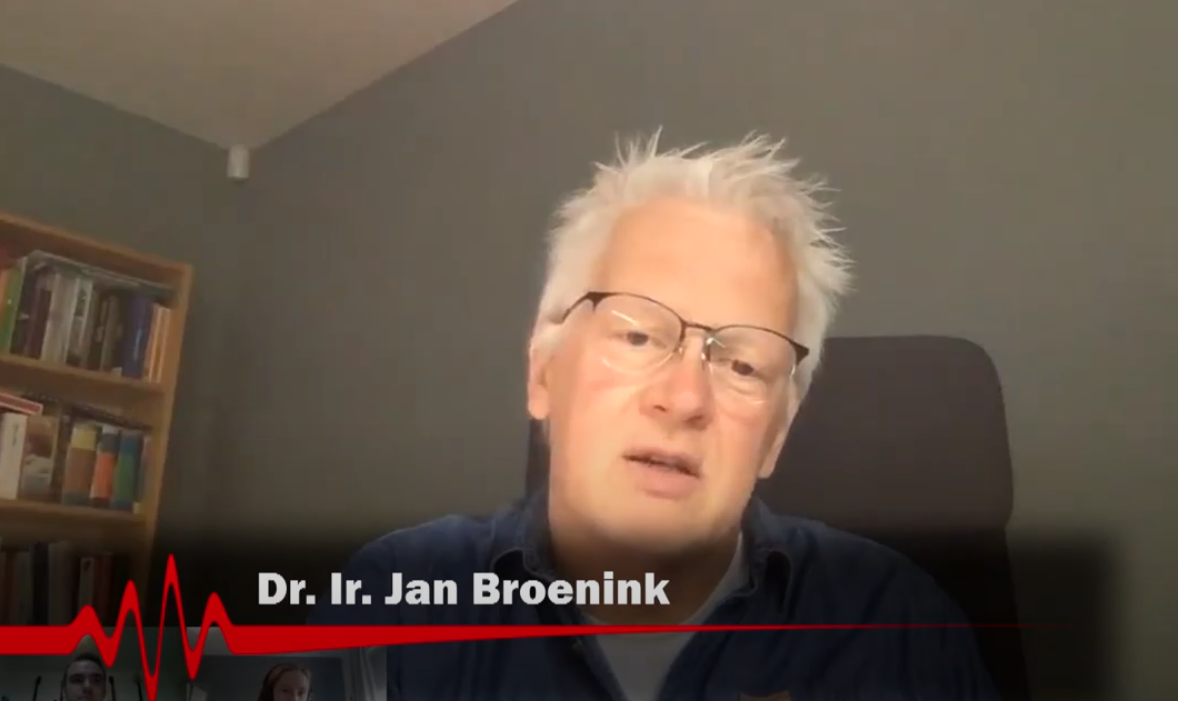
What are the benefits of online teaching that you experience?
“At least for one course, that is a 4TU course, where students of other universities have to listen through Blue Jeans, but now also the Twente students have to watch me through Blue Jeans. That is an advantage, because that is the same. The other advantage is that it is easier to make recordings of the lectures, so students can watch them later. Those are the only things I see as advantages.”
What are the disadvantages of online teaching?
“The real disadvantage is not having the eye-to-eye contact between me and the students watching my little performance. The immediate feedback whether things are understood or whether I am saying strange things, or when I am asking questions, is what I miss. What I do not miss is that people are staring at their phones or doing other things while sitting in the lecture. The students use the chat functions in Blue Jeans or in the canvas’ BigBlueButton and sometimes I just see the text too late, that is what I experienced. So, the communication is difficult during lectures? Yes, yes. But I think that people are getting more familiar with it, now I’m thinking a bit ahead. If the universities would choose to always have online classes, people would get more and more familiar with it. I think we can optimize our behaviour.”
Which environment do you prefer, online or physical classes?
“Physical is far better. For the 4TU version I have been broadcasting for about 10 years, with all kinds of systems, and the last few years with Blue Jeans. It is always a bit more complex in technology and it’s a hassle and I don’t like that. Maybe at this moment people are getting more familiar with it and the technology gets better and better, it might be doable.”
Do you have a message for the students?
“I would say, stay healthy and keep on communicating. You must communicate more explicitly. Being a student and being part of the university community is also participating in labs and doing work in lecture halls, you have to explicitly look that up and do it. I also think that this idea of video calls is a good idea to keep in touch with each other and that’s really important.”
Dr. Ir. Luuk Spreeuwers
How are you?
“Basically, I am fine, my family is healthy. There are not many changes. The only thing changed is that my wife’s work has decreased, she is a bit sad about it because she just started at the beginning of this year, but we are all healthy, the children have started going back to school as well. My only problem is that working with video conferencing for 6 to 8 hours a day is very tiring.”
What does your workstation look like?
“I have a very small table, it’s 1m wide and, I think, 60 cm deep. That is my workspace at the top floor of our house, and it is reasonably quiet here, so I am isolated from the kids and other noises. Sometimes, my neighbor works in the garden which makes me troubled, but the rest is fine. It is also reasonably spacious, maybe you cannot see it from the picture but there is a big bed and a room to walk around, so it is not so bad.”
What are the benefits of online teaching that you experienced?
“It is a little hard to say, because physical teaching is a lot better than this online teaching. One of the benefits you could have is that you could have more meetings and have meetings without travelling in between. Normally, when you have meetings, you have to go to different rooms, even at the university. Also, when you have to speak with people from abroad, this is very convenient since there is no travelling involved and you could save some time. But, talking to an empty screen, where you see no responses from the students, is terrible. So, you have to imagine that there is some audience out there and still do the same kind of behavior that you do normally in the classroom, but the interaction is not there. I am starting to get the hang of it a little bit, but at first it was weird. A one-and-a-half-hour lecture, just talking to a screen with hardly any responses is weird and it is not very satisfactory, I think. I can imagine that sometimes you do things like this if there are problems. So, we were told that, even for the next academic year, the bigger lectures will have to be organized like this, but I do not really like it. We do get some tools, such as a tablet that transfers the writing to the screen, so that you can use it as a whiteboard. That is nice, but on the other hand you do not have the interaction with the students. When I write at the white board and see faces which look confused and which seem to not understand the topic, then I continue to explain, now I do not have this feedback immediately.”
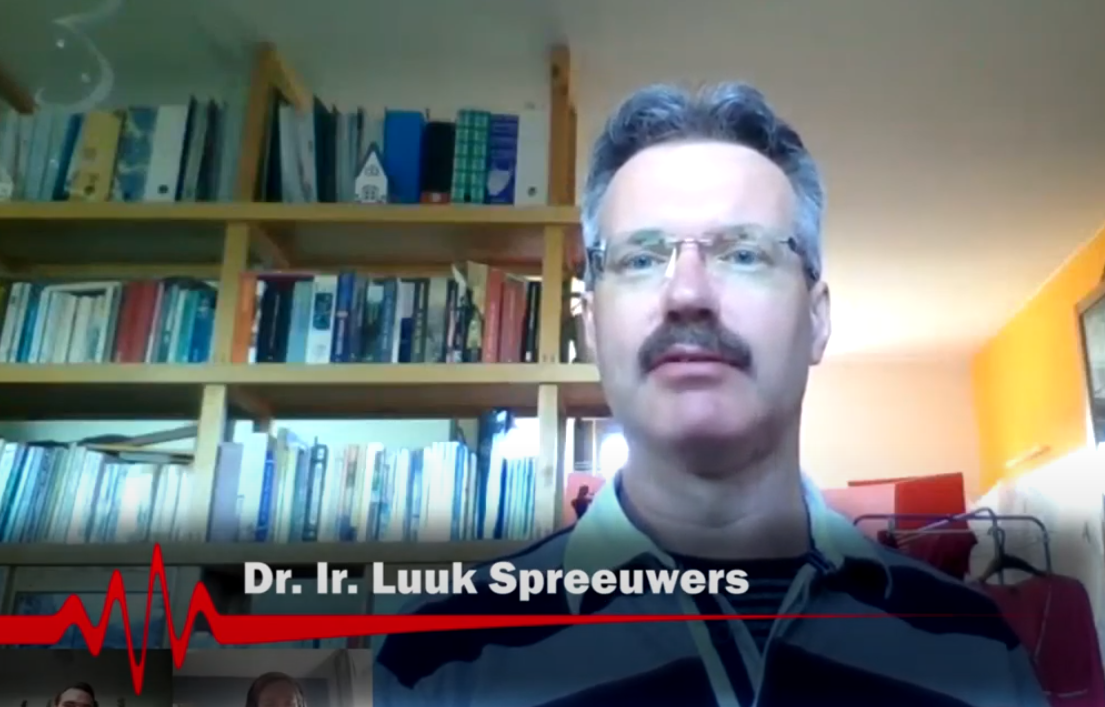
That seems to be one of the disadvantages of online teaching, is there anything else you really dislike?
“This is for the whole day and if you have all day 6 to 8 hours of video conferencing, teachings, meetings etc., it is very tiring. I feel more tired compared to a normal day. I really have to pay attention to go out now and then. There is a nice thing because I can have lunch with my family, which is nice.”
Which environment do you prefer: Online or physical classes?
“Physical classes are much better for me, also because you move around. Of course, I can move my arms during a conference, but you do not move around, and I like to move around a lot during lecturing. I noticed that it helps and makes the lesson more dynamic. That is not possible here. Well, I could try to walk around here, maybe that would be fun but then, probably the sound will be bad.”
Do you have a message for the students?
“One important message is: Go out and get fresh air. I talked with some students who say, “We are primarily inside our room over a month now.”. And I just told them, go out, go for a walk, go running, do whatever you do, cycle. The fresh air really helps me and when the kids had to study at home, we used to go out in the mornings for a walk so that they could get rid of their excess of energy and concentrate. It also helps me. Now, it is not necessary anymore and I already miss it. Now, I directly go to the top floor to start working, which is not good. So, I am missing the 7 km cycling to the university every morning. That clears your mind and that’s nice. For students, go out, get some exercise, and do other things as well. Do not stare at the screen all day, it is not possible.”
Do you have any message for the students when they come back?
“This will be over soon, and I hope in September, at least we could have some physical teaching again.”
Dr. Ir. Mark Oude Alink
How are you Mark?
“I’m doing good, since the module has just ended, I’m busy processing all the handed in materials. My family is also doing great fortunately. I am getting some weird looks when I’m out and about because of my hay fever attracting some suspicion.”
What does you workstation look like?
“I actually brought all the items that I would use in my office home, so in that way not much has changed. I have to sit at the kitchen table, which has the advantage that the two most important appliances are close to me: my computer and my coffee machine.”
What are the benefits of online teaching from your personal experiences?
“I don’t really see any benefits for my assigned tasks to be completely honest. The goal of module 11 is to work together in a large team to create a large prototype, which is very hard to do from home. I also noticed receiving a lot less questions for an unknown reason, where normally students were used to walk in and ask questions far more often. I like the open-door policy in general, but it seems like for students the bar has been raised for asking a question.”
Are there any other disadvantages?
“Electrical Engineering does not consist of theory alone; it also means creating something new. Not being able to create and make mistakes takes away from the learning experience of studying Electrical Engineering. The lack of social connections also makes it harder to tell if the student really understands, where I could usually estimate and assist if I noticed a student not understanding a certain topic.”
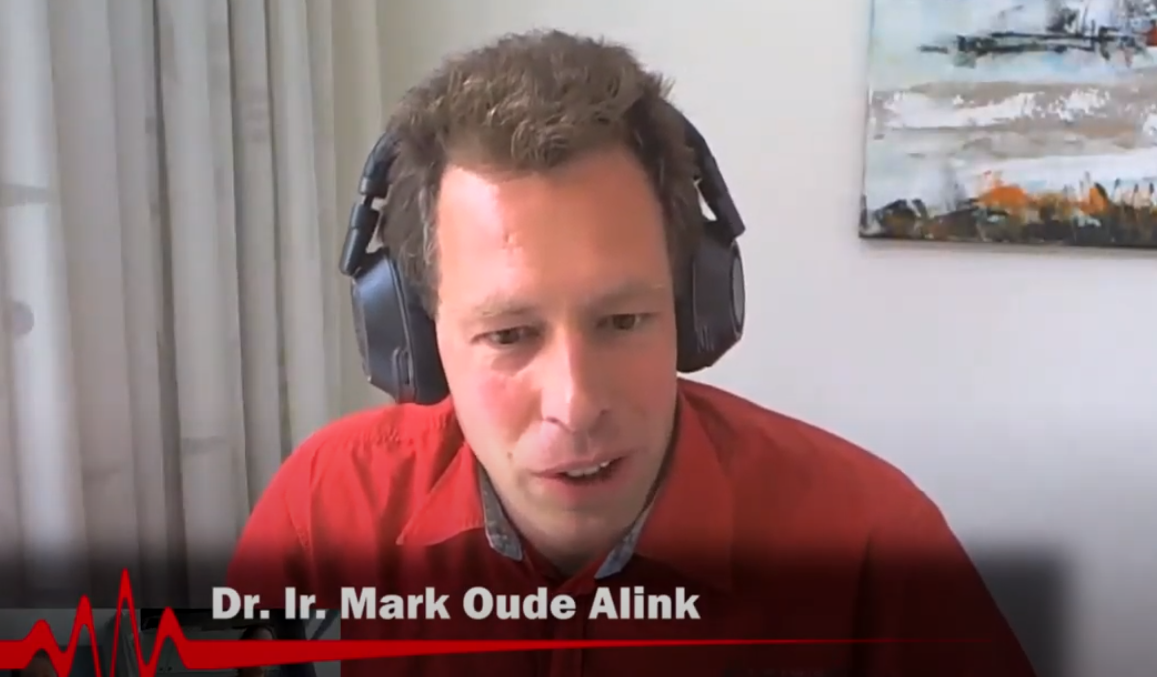
Which environment do you (obviously) prefer?
“Really easy question to answer: physical classes. I expect I would have said the same thing if I would not have had to experience teaching online. “
Do you have a message for the students?
“First, I would like to address the students now taking module 11: Most of you have done an excellent job switching environments in the middle of the module, not just in execution but also in terms of project management. Usually we would end with a very cool event, but because this year it is not possible, you are all invited to next year’s concluding event of module 11!
To all EE students, I would like to encourage you to knock on virtual doors, just as you did on our physical doors, do not hesitate to ask questions to your teacher! Try not to just think about how you are having a tough time, but also keep your teachers in mind! Keep it up during quartile 4, after which you may enjoy your summer break, which you have earned after this very hectic year. Take care!”
Prof. Dr. Ir. Peter-Paul Verbeek
How are you?
“I’m quite good, life is busier than it used to be in terms of activities. The virus gave rise to a lot of new ethical questions in society, with the new corona apps that are being developed. Many newspapers wanted to have interviews hearing the opinion of philosophers. On the other hand, it is also nice that the stress has gone. No travel, not the trains and the plains and having your family around you. It is something I enjoy, so it is ambivalent.”
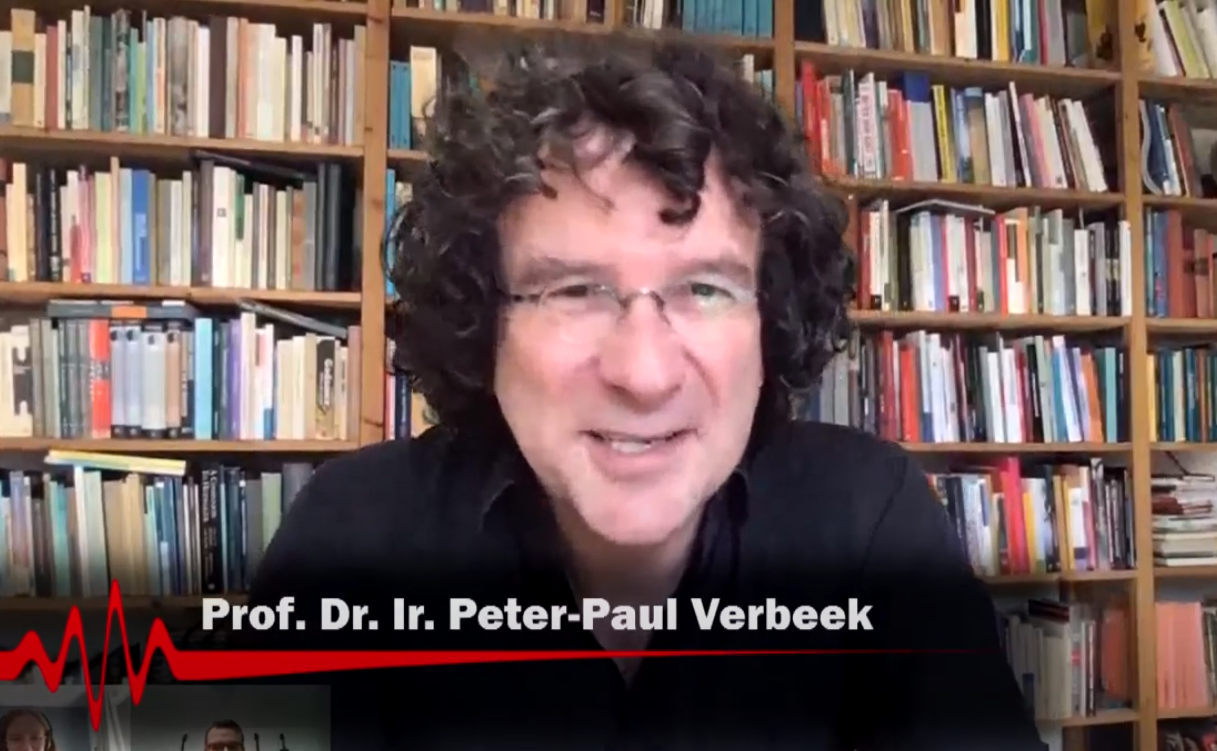
You probably work from home; can you share something about your workstation?
“There are two places where I normally sit, this is the regular place. It is the study in the house. It is also the place where kids play music, there is a piano, a bass guitar, drums, and a saxophone. If they have music lessons or want to practise, I move upstairs, to the bedroom where I have a small desk so I can have meetings there when it is needed.”
You have been teaching to the EE students during the 11th module, what are the benefits of online teaching that you experience?
“I am not sure there are many benefits to be honest, the handicap is that it happened during the module. We could not design the module for distance learning, for online teaching. I was kind of lucky that we had done most of the meetings for my part of the module, so we only had some interactive sessions, a Q&A, online. I am now also teaching in the health science bachelor and the advantage there is that you can give the students a richer form of preparation for the lectures. I can now give them videos or let them read some material, so the online meetings focus much more on the discussion. It is much more in-depth, and my impression is that students are more prepared and want to get more out of the interactive session. I miss the connection with students and the direct interaction, that makes it really rewarding to do teaching. I miss that, but I notice that it can enhance the learning experience for students. Part of it by doing some things more intensively online, perhaps we can do part of this when the university will open again.”
Could you share something about the disadvantages?
“Well, you miss the direct contact with students. It is not only about conveying knowledge, but also about conveying an attitude and scientific spirit and the fun in doing science or in my case philosophy. You can convey that more easily when you are there live, and I must also say that part of the work as a teacher is getting in touch with the well-being of students. There are always students of which you notice that they might not feel so good. That is of course not possible in the online situation. You could do it in 1 on 1 interaction, but the sessions I have had this far have not had that dimension. That is also a big pity, because this is also what universities are for. It is a very intense period in your life as a student, you develop as a teenager into a professional. This also brings psychological elements for some. And I have always, and still am, enjoying that element of work.”
Which environment do you prefer?
“Physical classes, definitely. We waste the crisis if we don’t learn from the good things that this digital period brings. Harari, a famous historian of technology, who also has a lot of interesting things to say about the present and the future, has said that we are doing one big social experiment with digitalisation, especially with education. A good experiment is only a good experiment when you learn from it, right? That is why I find it interesting to hear from you that many teachers are sharing this [students being more prepared for the lectures, ed.] opinion. And maybe this will give a push to the elements of digitalisation that can bring benefits. At the same time, we discover the importance of physical nearness. Maybe we will start to appreciate that also. I hope that after the crisis we have this new mix of online and offline, digital and physical contact between teachers and students which will enrich the studying and teaching experience.”
Do you have a message for the students?
“I think studying is not only about intellectual things, it is also about learning lessons in life. I noticed from my own oldest son, who is a student, that is what he misses most. Contact with other students, opportunities to go on study tours, etc. So, I think that my message to all of you is not to despair and don’t give up and do as many of these things as soon as the world is opening up again. Try not only to catch up or to stay in line with the intellectual tasks that you have, but also with life and developing yourself on doing things besides your study. I hope you can go full speed with that again soon.”
Prof. Dr. Ir. Raymond Veldhuis
How are you?
“Well, I’m fine actually. I know that some people, especially people with younger children, find it troublesome to work from home. But for me not much has changed. I am doing precisely the same things that I did before: having meetings and talking to people and sometimes a bit of research. I miss walking in and out of the offices of my colleagues, and meeting students and colleagues in person, but actually there are also a lot of good parts, for instance, I usually travel 2.5 hours a day from home to work, and I can skip that now. So that is nice, that’s wonderful.”
Well, it’s nice to hear that you are well. What does your workstation look like?
“Yeah, on the left-hand side there’s my laptop, on the right-hand side there’s my iPad working as a screen, there’s a second screen in the middle and recently the department bought pen tablets so that works as the fourth screen. That is in the middle just below the other screen. And it’s the pen tablet that I use nowadays if I’m lecturing or if I want to share a screen or if I want to share notes with someone, I run a program there and I can draw and talk. And that is quite okay. It looks a bit like the cockpit of an airplane.”
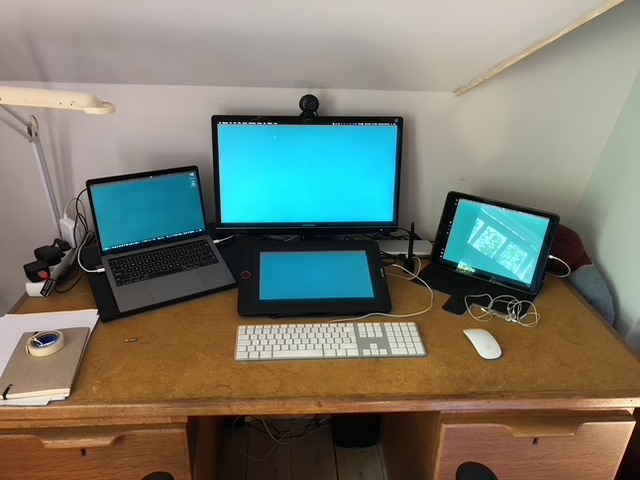
What are the benefits of online teaching that you experience?
“Not that many. I think it is easier to keep notes because with all these screens I can keep a lot of material in front of me that I can switch between. The other thing is that you do not have to move to a lecture hall, so you can start on time. Time wise it is somewhat more efficient. But what I did was transfer my way of lecturing like using notes on a blackboard to using a pen tablet and like a black board. That is not ideal for online teaching I would say. If you want to explore what the advantages are, I think you should experiment a bit more with norms of teaching and not just copying what you do to an online fashion.”
What are the disadvantages of online teaching?
“My style of teaching is with a bit of interaction with the students. So, I like to interrupt and ask questions, I also like to watch their faces and see if they pick up or at least some of them pick what I’m talking about and that part is really missing. So, it’s a bit dry and boring to just talk to the screen.
I imagine that this might work if you have to teach a very large group where you won’t have that advantage anyhow, but the 50,60-80 people is still relatively small. I really miss the direct interaction. I cannot stop, improvise and say, ‘what do you think about this? ‘or ‘do you know how this would work?’. You can’t manage that online, at least I haven’t even tried but I wouldn’t know how to do it.”
So which environment would you prefer, online or physical classes?
“Physical classes, but at the same time if you really think about it a little longer and if you would look to the future where maybe we have classes of over 100 students, then maybe physical classes also might not work anymore. Then you might find other combinations like small online lectures like 15 minutes each or something like that, somewhat more interactive, maybe just pre-recorded and have some kind of interactive sessions online in some sense, and then it might be an advantage. But in the traditional way with a relatively small group I prefer the physical thing.”
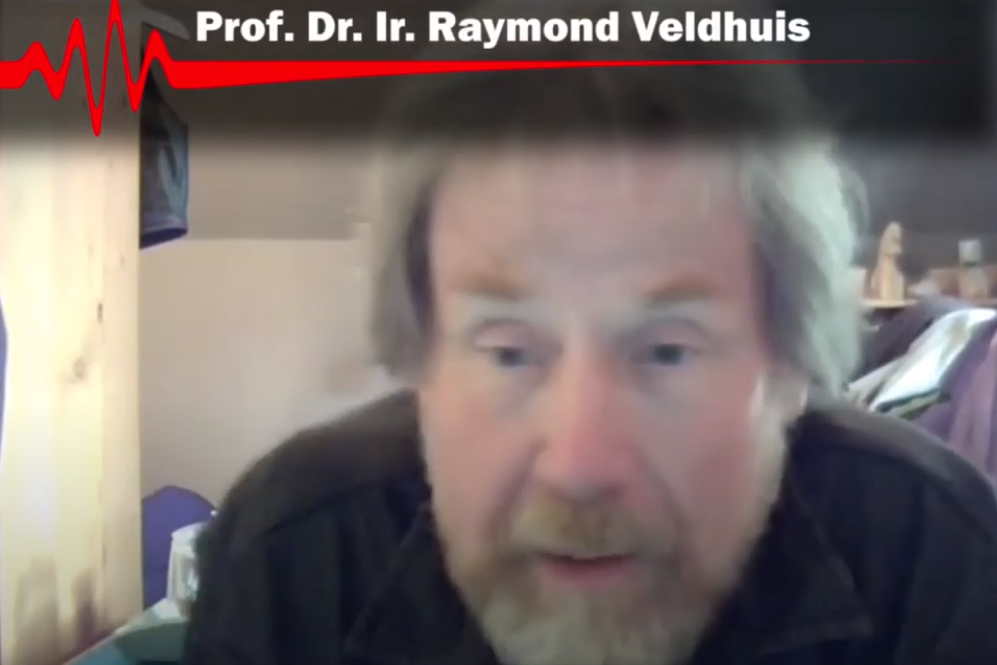
Do you have a message for students?
“Stay focused is one thing. Get away from the screen every now and then. Stay healthy and try to do things that make life still enjoyable.”
What do you like to do that makes life more enjoyable?
“Well what I like about this is that sometimes I can just leave my office, have a coffee, talk to my family. I go out running quite often. I like to work a bit on the motorcycle every now and then. So, I can be a bit more flexible with my time. On the other hand, I also have a feeling that I spend more time behind the screen than what I did when I was in office. Things around the house can be enjoyable. We live in the countryside so it’s easy to go out run or walk.”
